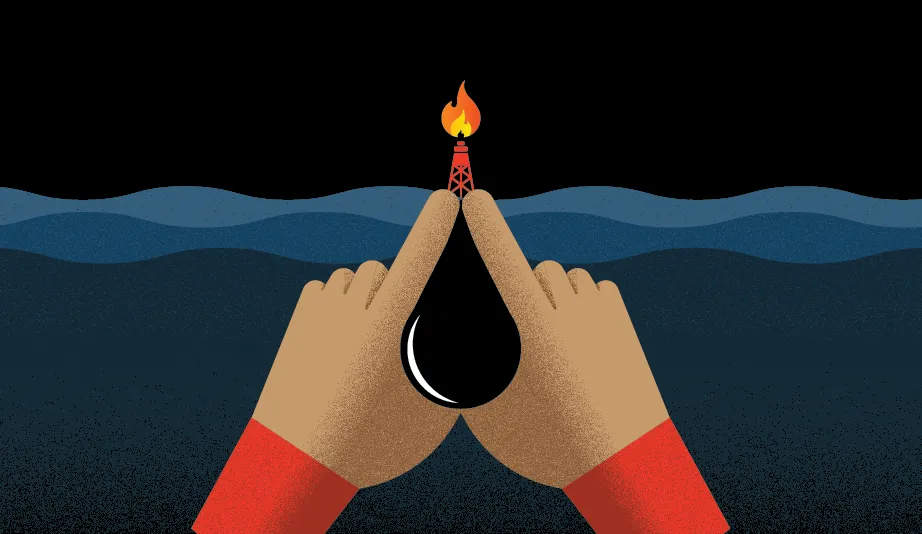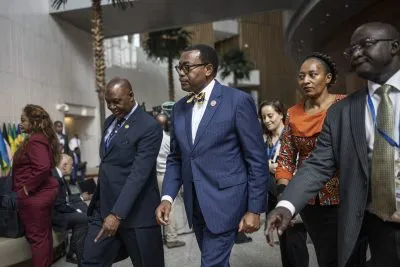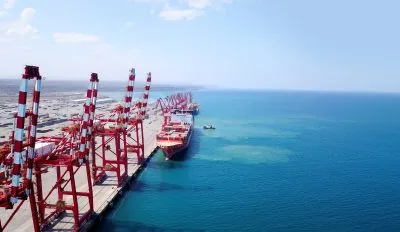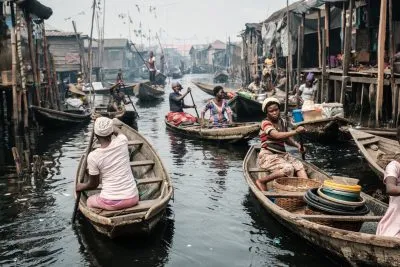“Let me stop you right there,” interjected Guyana’s president, Mohamed Irfaan Ali, during a combative BBC Hardtalk interview in late March.
Ali was being challenged by anchor Stephen Sackur on the environmental impact of oil production in the Caribbean nation that could potentially be worth $150bn – but he was in no mood to accept criticism of the carbon emissions that will result. The visibly angry president railed against wealthy nations that “lecture us on climate change,” slamming the “hypocrisy” of environmental arguments coming from countries that are responsible for the vast bulk of emissions released since the industrial revolution.
“Did you know that Guyana has a forest that is the size of England and Scotland combined,” he demanded, “a forest that stores 19.5 gigatons of carbon, that we have kept alive? “I’m going to lecture you on climate change. We have kept this forest alive that you enjoy, that the world enjoys, that you don’t pay us for, that you don’t value.”
Ali’s argument, which quickly went viral on social media, struck a chord across the Global South – and especially in Africa. Least responsibility Africa, indeed, is the continent that bears the least responsibility for climate change. Of all the carbon dioxide released from burning fossil fuels over the past two centuries, Africa is responsible for just 2.8%. Europe has produced more than 10 times as much carbon emissions as Africa over this timeframe.
It is not surprising, then, that African governments bristle at any suggestion that they should abandon plans to develop their oil and gas resources. Several African countries are in a similar position to Guyana, having discovered major hydrocarbon reserves in recent years. Senegal is now set to become Africa’s newest major oil and gas producer. Australian company Woodside Energy plans to start pumping oil from the offshore Sangomar field in the next few months. A gas field operated by BP that straddles the Senegal-Mauritania border is also expected to begin production this year. Revenues from these projects are a key reason why the country is projected to reach GDP growth approaching 10% in 2024 – among the highest in the world.
But it is far from certain that other African countries will be able to follow in Senegal’s footsteps. Financing the huge costs of deepwater offshore projects is getting more difficult. Demand for oil in some key export markets is already declining, with gas demand also set to peak in the relatively near future. Against this backdrop, a complex range of factors – which are as much economic as environmental – will decide whether keeping resources in the ground is ever seriously considered. Attention in Africa has largely focused on the contested role of natural gas as a “transition fuel” in bridging the gap between fossil fuels and renewables.
“There are so many things that are happening when it comes to the energy landscape in Africa, but natural gas is very much part of that in the short and medium term,” said Amani Abou-Zeid, the African Union’s commissioner for infrastructure and energy at the International Renewable Energy Agency (IRENA) Assembly in Abu Dhabi in April. The commissioner added that fully exploiting its natural gas resources would only marginally increase Africa’s share of global emissions.
“No-one can preach [to] Africa when it comes to emissions and our position and our commitment to the climate issue,” she said.
Is the West really trying to stop Africa from developing its resources?
But critics say the narrative that “the West” is seek – ing to stop Africa developing its resources is overly simplistic. It is rare to hear governments or international institutions directly supporting the ‘keep it in the ground’ argument.
Francesco La Camera, director-general of IRENA, told African Business that “we have never asked to stop oil and gas production.” He argued that gas production should be declining worldwide by 2025 in order to keep global temperatures within 1.5 degrees of pre-industrial levels. He acknowledged, however, that some new investment in gas is needed to avoid a rapid decline in gas production “that could be not so rapidly compensated by renewable energy”.
Meanwhile, it is oil and gas companies headquartered in Europe or North America that are usually first in line to develop projects in Africa. European governments, particularly from Italy and Germany, have scoured Africa since 2022 in search of gas that could help to replace supplies from Russia. Explicit opposition to developing oil and gas tends to come more from NGOs – both in Africa and abroad – than from governments. African environmental campaigners accuse the West of hypocrisy for talking tough on emissions to domestic audiences, while allowing its companies to invest in oil and gas projects abroad.
Referring to the oil pipeline being built by French company TotalEnergies, Ugandan environmental activist Hilda Flavia Nakabuye told a conference in Berlin in 2022 that “the greed exhibited by your leaders and Global North corporations is a danger to the lives of people in Africa. It is a danger to wildlife and a threat to future generations.
“Despite promising time and time again to cut fossil fuels at home, European backing for the East African Crude Oil Pipeline is clear evidence the region continues to support devastating fossil fuel projects in the Global South,” she said.
Other NGOs argue that focusing on renewables is the best long-term strategy.
“African countries are better off prioritising investment in cleaner, renewable energies given the vast potential the continent has in this area,” says Gerald Byarugaba, extractive industries advisor at Oxfam in Africa.
Africa has “60% of the world’s best solar energy resources,” according to the International Energy Agency (IEA). Byarugaba believes, however, that the onus is on industrialised countries to lead the way in decarbonising. “It is clear that those countries that are responsible for the climate crisis should drastically and immediately move away from fossil fuels and give financial assistance for those countries that have not caused the crisis,” he says. “We believe this is not a Western environmental agenda but a global equity agenda.”
Environmental arguments notwithstanding, it would be hard for African governments to justify leaving oil and gas in the ground. These resources can potentially generate billions of dollars a year in much-needed revenues. Senegal, for example, expects oil and gas from the projects that are on the cusp of entering production to add around 3% to its GDP each year. Gas can also make a major contribution to power generation and can help close the continent’s energy access gap. Around half of Africa’s population continues to lack electricity access.
For African governments, keeping oil and gas in the ground would only be economically rational if wealthy countries offered considerable financial compensation for doing so. There is little evidence of this being forthcoming. Byarugaba says that developed countries have been slow to deliver on the pledge, first made in 2009, to provide $100bn a year in climate finance to the Global South.
“The figure is anyway now agreed to be a large underestimate of their real financial needs,” he notes.
On to the COP29 conference
This year’s COP29 conference in Baku, Azerbaijan, will see a push for new climate finance goals. But the finance made available under climate finance mechanisms typically takes the forms of grants and loans, often intended to help develop renewable energy. This is very different to providing direct compensation in return for not developing oil and gas.
Demba Diallo, managing director and head of project development at infrastructure investor Africa50 – which is owned by several African governments, the African Development Bank and two central banks – says that gas is the “right tool” for the energy transition in Africa. He insists that “there is no other way” to provide affordable and reliable energy on the continent, without including gas in the mix. “Reality is reality,” he says. “Gas is abundant in Africa,” Diallo adds. “It’s more reliable in terms of availability. And at the same time, it is cost effective.”
Africa50 has invested in Senegal’s Malicounda power station, which will generate electricity from local gas. Diallo says Africa50 would also consider helping to finance midstream and downstream projects, including gas pipelines and facilities to store liquefied petroleum gas (LPG). LPG, delivered in gas canisters, can be used as a fuel for domestic cooking. It is much cleaner than other widely-used fuels, including charcoal and other forms of biomass. The need to collect wood and charcoal for cooking are major drivers of deforestation, while indoor air pollution causes hundreds of thousands of deaths per year in Africa. An estimated 900m on the continent lack access to clean cooking.
Fossil fuel investment dries up
Despite the enduring interest of global firms, once a major oil or gas discovery is made, the biggest challenge for African governments and their commercial partners is in finding sources of finance to develop projects, says Barthélemy Faye, a partner at law firm Cleary Gottlieb. “The bar for projects now to get to production has really risen.”
Large energy sector projects in Africa typically seek financing from development finance institutions (DFIs) and multilateral development banks. Many of these institutions have, however, imposed policies restricting fossil fuel financing in recent years. Some, including the European Investment Bank, have committed to ending all financing for fossil fuel projects. Most other DFIs make some provisions for financing gas developments, although only under limited circumstances. For example, British International Investment, the UK’s DFI, will finance only LPG projects or some types of gas transport, storage and distribution infrastructure. It will not fund upstream gas developments. Oil projects are largely ineligible for DFI funding.
Faye notes that the reluctance to finance oil and gas developments extends beyond concessional lenders. Major international banks and investment funds are also wary of being associated with fossil fuels, he points out. Even international oil companies are under pressure from their investors and other stakeholders to reduce their carbon footprints. Diallo says that while Western governments have taken a “political stance” that limits how much financing their DFIs can provide to oil and gas, other countries are willing to step forward. China is of course highly active in Africa’s oil and gas sector. In recent years it has switched tactics in favour of taking equity stakes in projects, rather than providing loans. Other non-Western powers, notably from the Gulf states, are also increasing their involvement in the sector.
And Diallo – who headed Senegal’s sovereign wealth fund before joining Africa50 last year – adds that African financial institutions are poised to play a greater role in helping the continent develop its oil and gas infrastructure. Gas infrastructure offers the type of long-term returns that sovereign wealth funds are looking for, he notes. “I’m pretty confident that we’ll be able to finance our gas projects in Africa locally,” he says.
Tough choices for emerging producers
One of the biggest tests of whether huge new oil and gas projects are able to attract the necessary financing will come in Namibia. International oil companies have made huge hydrocarbon discoveries in the country’s deepwater blocks. Total’s 2022 oil discovery in the Venus field is thought to be among the largest ever made in Africa. Oil and gas consultancy Wood Mackenzie stated in a research note published last November that it expects Namibia to be pumping 500,000 barrels per day within a decade – making the country one of the top producers in Africa. But it is not a foregone conclusion that these resources will be brought into production.
“At a water depth greater than 2000 metres and reservoir depth of 6000 metres, exploiting these fields will push the boundaries of industry capabilities,” Wood Mackenzie said. “Innovative solutions and high-specification equipment will be needed, adding to development costs.”
The bill for developing oil and gas fields off the Namibian coast is sure to run into many billions of dollars. The fact that Namibia is almost entirely lacking in existing infrastructure will only add to the costs. Developing a major deepwater “greenfield” project in Namibia will be considerably more costly than working in a country where discoveries are adjacent to existing production infrastructure and where logistical support is already in place.
“Timing will also prove a complication,” says Nick Branson, associate director and energy transition lead at consultancy Africa Practice. He notes that the Namibian government is pushing for gas to be piped to a gas-to-power plant, whereas developers want to reinject gas from the fields to maximise oil output, at least until liquefied natural gas (LNG) export infrastructure is available. While Branson says that revenues could be “transformational” for Namibia, he adds that the government has to contend with scepticism over whether it can cope with the changes.
“Outsiders question whether Namibia has sufficiently robust public financial management and oversight mechanisms to maximise the benefits of an oil and gas windfall that is set to coincide with an energy transition that will likely constrain global crude demand.”
Peak oil?
Forecasting demand for oil and gas decades into the future is far from easy. Oil consumption is already falling in Europe and the IEA predicts that global demand will peak by around 2030. “Peak gas” is a more distant prospect globally, since it remains important in electricity generation – though many projections point to significantly lower gas demand in Europe, a key export market, particularly for West and North African projects – within the next decade.
The Gambia is another country that could join the ranks of oil and gas producers. Although no commercial discoveries have been made in the country so far, its offshore blocks lie tantalisingly close to Senegal’s Sangomar field. In an interview with African Business Nani Juwara, The Gambia’s minister of petroleum and energy, said that the country has “huge potential” in the oil and gas sector and insisted there is “no doubt” that it would be able to commercialise any discoveries. Juwara adds that The Gambia would be flexible in allowing oil and gas companies to make use of infrastructure being developed on the Senegalese side of the border.
“We don’t expect any issue when it comes to sharing infrastructure for some of those developments,” he says, noting arrangements would be up to the companies themselves to negotiate.
Whether other governments are willing to be as accommodating remains to be seen. Given that international oil companies face finely balanced decisions on whether to proceed with developments, their relationships with governments and regulators could prove to be a decisive factor. Governments in Namibia and potentially The Gambia can draw lessons in this respect from other African countries where developments have been beset with problems. Uganda is still to begin commercial production nearly two decades after oil was first discovered in the country, partly due to tax disputes between the government and oil companies. Mozambique has also faced a difficult journey on the road to becoming a major gas producer, with a series of massive corruption scandals delaying many of the expected benefits of its developments. Even Senegal has sent shivers down investor spines. Its new president, Bassirou Diomaye Faye, announced a review of oil and gas contracts immediately after taking office.
Ultimately, it is hard to imagine that the truly vast oil and gas resources that are being discovered off Africa’s coasts will be left in the ground. But while few governments would seriously consider turning down the windfall that can come from hydrocarbons, turning potential into production is becoming steadily more challenging. Oil and gas deposits have rested undisturbed beneath Africa’s soils and seabeds for millions of years.
But for African countries that want to make use of their hydrocarbon wealth, the window of opportunity may be closing. Only 26 years remain until 2050, usually mooted as the global target date for net zero. As this deadline approaches, delivering oil and gas projects will become more difficult than ever.
Want to continue reading? Subscribe today.
You've read all your free articles for this month! Subscribe now to enjoy full access to our content.
Digital Monthly
£8.00 / month
Receive full unlimited access to our articles, opinions, podcasts and more.
Digital Yearly
£70.00 / year
Our best value offer - save £26 and gain access to all of our digital content for an entire year!
 Sign in with Google
Sign in with Google 




